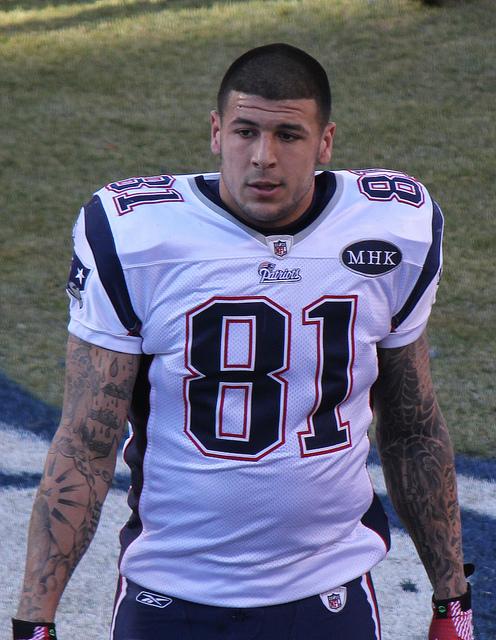By Jose Castillo, news correspondent
As the New England Patriots gear up for one of the biggest games in all of sports, a former teammate prepares for a trial that could be just as life-changing as winning a Super Bowl.
The trial of former Patriots tight end Aaron Hernandez is set for Thursday, Jan. 29 after the original Tuesday date was moved due to Winter Storm Juno. Eighteen jurors will take oaths in Bristol Superior Court under Judge Susan Garsh and will be followed by opening statements. Hernandez has been accused of one count of first-degree murder of semi-professional football player Odin Lloyd.
“That was such a shame, because he was such a promising player,” freshman chemical engineering major and lifetime Patriots fan Michael Lanzillotti said. “But it’s terrible that he [allegedly] killed someone.”
Hernandez was a rising star, both within the Patriots organization and among the NFL, scoring 18 touchdowns and receiving 175 catches for 1,956 yards in his first three seasons. Ten months before the day of the alleged murder, Hernandez signed a five-year extension deal with the Patriots for $400 million.
On June 13, 2013, Hernandez and Odin Lloyd were seen at local Boston club “Rumor.” According to witnesses, Hernandez became irritated after seeing Lloyd with a group of people Hernandez supposedly disliked. Surveillance videos indicated that four days later, in the early morning of June 17, Hernandez, along with 41-year-old Ernest Wallace and 27-year-old Carlos Ortiz, drove to Lloyd’s home, where Lloyd got into the vehicle with the other men.
At 3:07 a.m., Lloyd texted his sister, stating, “You know who I’m with.” Lloyd’s sister had expressed confusion, to which Lloyd replied, “Nfl,” indicating the now former professional football player.
Fourteen hours later, Lloyd was found dead from multiple bullet wounds in an industrial park in North Attleboro, two minutes from Hernandez’s residency. Overnight construction workers reported hearing gunshots the night before. Keys to a rental car, loaned to Lloyd by Hernandez, were found in Lloyd’s pocket. Authorities quickly listed Hernandez as a suspect, and, soon, media outlets and fans alike scrambled to the home of the Patriots player to catch a glimpse of him.
On June 26, 2013, Aaron Hernandez was arrested at his home in North Attleboro. An hour and a half later, the Patriots released Hernandez from the team.
Hernandez later pleaded not guilty to the murder of Odin Lloyd in a hearing on Sept. 6, 2013.
Evidence against Hernandez includes video surveillance of Hernandez and the two other suspects’ vehicle throughout the night and another video of Hernandez holstering a weapon on the night of the alleged murder. Other possible pieces of evidence have been destroyed or excused by the courts.
Hernandez allegedly destroyed both video recordings from his home security system and his phone after officials asked for them. Maids scrubbed Hernandez’s residency the day after the alleged murder, and Lloyd’s final texts have been dismissed from the permissible evidence list, as the defense would not be able to question and cross-examine Lloyd in order to find what he meant by the texts he sent.
“There has been an incredible rush to judgment in this case due to a misrepresentation of facts,” Michael Fee, Hernandez’s attorney, said to a group of reporters on August 22, 2013. “Aaron Hernandez is an innocent man as we stand here today…and we will see if a jury would like to carry on that verdict.”
As the trial begins, Hernandez faces a series of other legal problems. On May 15, 2014, Hernandez was charged with the murder of both 29-year-old Jorge Correia de Abrea and 28-year-old Safiro Teixeira Furtado.
The Correia de Abrea and Furtado case was a double homicide.
Hernandez is also being sued by former friend Alexander Bradley, who lost his eye after Hernandez allegedy shot him after an altercation in a Miami strip club.
Photo courtesy Jeffery Beall, Creative Commons.









